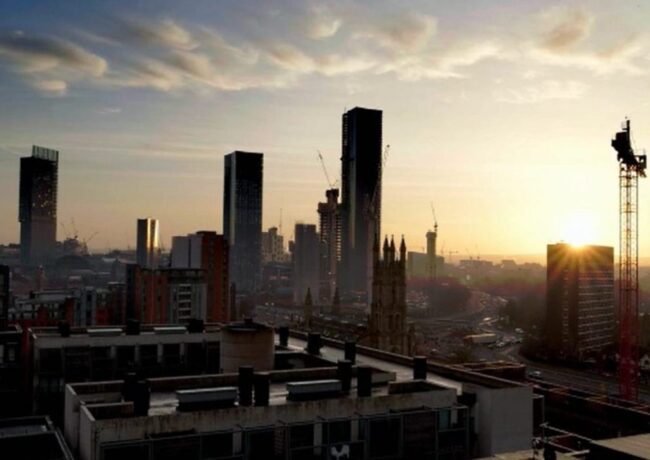REVIEW | ‘Manctopia’ is shallow attempt at tale of two cities
The first episode of BBC Two’s four-part series about the building boom in Manchester makes for far-too-easy viewing as it fails to shine a light on the complex economic drivers behind the city’s breathtaking growth in recent years.

Manctopia: Billion Pound Property Boom meets the people living and working in Manchester’s residential development market. Filmed over 12 months, the series aims to tell the story of one of Britain’s fastest developing cities, whose population is set to double in the next five years.
The first episode, which aired on Tuesday night, sets up this story as a tale of two cities – the wealthy developers constructing thousands of swanky new flats on derelict swathes of land and the investors looking to buy them, versus the people that for whatever reason are not benefitting from the boom and are being priced out of the city centre or falling between society’s cracks.
The episode starts in a light-hearted tone with glamorous Manchester-born estate agent Jennie Platt recalling times dancing at the Haçienda nightclub in the 1990s, while driving to show prospective buyers including fashion designer Helen, who has 250 pairs of shoes, around luxury apartments.
One of the viewings is of a £1.4m penthouse available for rent at £8,000 per month. Platt notes that many of her clients are wealthy overseas investors, and says that for Manchester to be “sustainable, we will need to build more affordable housing in the city centre, too”.
The next story is of Salford-born Christina Hughes, an employed single mother-of-two living in Winton and portrayed as a victim of the housing race. Presented with an eviction notice due to a change in her landlord’s circumstances, Hughes – who says she has never missed a single rent payment – finds that private rents in her local area have increased so much since she signed her lease that she can no longer afford to pay them.
Her only way of remaining in the area she knows and loves is to be catapulted onto the desperate council housing waiting list, bidding on a slim pool of potential properties while living in her mum’s bungalow. She eventually finds a small two-bedroom flat to accommodate her family and seems resigned to, if not happy about, her much-changed quality of life.
The episode pans to Tim Heatley, co-founder of developer Capital & Centric, standing at one of his development sites in Piccadilly East, currently a red light district, and observing a ‘price list’ detailing the cost of blowjobs and other services scrawled on a scrap of paper pinned to the railings.
“We’ve got…this kind of activity…right next to a block of apartments, some of which will cost a million quid,” he says, scratching his head, both sympathetic to and troubled by the reality of the area he is hoping to regenerate.
“You can feel the city bashing up against itself,” Heatley adds. “And you get the feeling that now the [development] has started, it has to happen. It can’t fail now – too much money has been put into it. It could all go catastrophically wrong if people don’t buy into the vision.”
Heatley’s keen observation could be the start of an interesting investigation into the socioeconomic and capitalist considerations that the property industry grapples with daily, but the episode hurriedly moves on.
The final character in the piece is Richard, who worked as a school janitor for a decade before suffering mental illness after the death of his brother and losing his girlfriend, job and home.
Sleeping in one of the city’s many homelessness shelters, Richard describes how he has lost hope and “doesn’t give a shit about anything anymore”, but he smiles for the first time in a long while when eventually placed in temporary accommodation and given the opportunity for a fresh start.
Richard’s story is perhaps the only one with sufficient depth and scrutiny, but overall the episode fails to explore the various threads it opens in any meaningful, analytical way. Heatley comes over well, but to interview only one developer – particularly when the development industry is implicitly blamed for the problems the less fortunate characters in the episode face – is a huge oversight that is sure to disappoint the region’s property professionals.
Manchester faces the same problems many other growing regional capital cities have, and it remains the envy of smaller UK cities – but this episode sadly only scratches the surface of its highly complex growth story.

Register for Place North West’s GM Development Update next month




